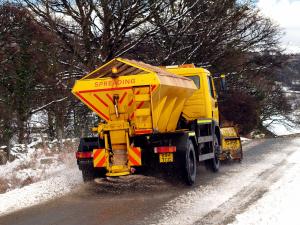Prepare for winter driving conditions
Date published:

Take extra care on roads
Darker mornings, evenings and lower temperatures around this time of year make conditions more difficult.
Road surface temperatures are usually a few degrees lower. Drivers should not rely on in-car temperature sensors as a sign of possible frost or ice.
Drivers should:
- slow down
- stay focused and alert
- never ever drink or take drugs and drive
- always wear a seatbelt
In particular, watch out for vulnerable road users such as pedestrians, cyclists, motorcyclists and horse riders. They will be much more difficult to see in the dark mornings and evenings.
Remember, you should follow the advice in the Highway Code and drive, ride or cycle with extra care, even if roads have been salted.
You should also be prepared for road conditions changing over short distances, and take care when overtaking gritters.
You should note that:
- a journey could start or end on an untreated section of road
- salt does not act immediately, it needs vehicles to turn it into an effective solution
- roads can refreeze after spreading, particularly in showery conditions
There is more information at this link:
Everyone has a personal responsibility to keep themselves and other road users safe.
Salting roads and reporting an issue with ice or snow
You can find information about the salting of roads, and report an issue with ice or snow, at the following page:
Up-to-date road conditions information
You can get up-to-date information about road conditions during the winter on the TrafficwatchNI website.